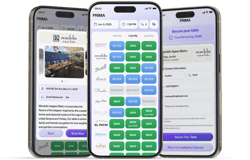The Senior Hardware Development Engineer, Tactile Sensing is responsible for the design, development, and validation of integrated hardware systems for robotic platforms and automation products. This role's focus spans electromechanical systems, sensors, embedded electronics, and power distribution. The engineer will specialize in the sensorization of robotic components, pioneering novel sensing systems to improve the utility of mobile robots by enabling them to effectively touch and interact with the world. By evaluating performance, reliability, and manufacturability in dynamic environments, this individual ensures robust hardware integration. Working across electrical, firmware and mechanical disciplines, the Hardware Development Engineer plays a key role in delivering reliable and scalable robotic solutions.
Key ResponsibilitiesWork with multi-disciplinary teams to design, fabricate, evaluate and demonstrate new sensing solutions for reliable closed-loop, whole-body manipulation behaviors.
Design, prototype, and validate robotic hardware components such as PCBs, sensor modules, harnessing, and enclosures.
Evaluate and select materials and components suitable for robotic use cases involving motion, vibration, thermal loads, and environmental exposure.
Conduct hands-on testing, failure analysis, and root cause investigations to improve reliability and performance of robotic systems.
Collaborate with cross-functional teams in software, systems, manufacturing, and test engineering to define hardware interfaces and ensure successful integration.
Support design for manufacturability (DFM) and design for test (DFT) initiatives for robotic subsystems.
Maintain detailed technical documentation, including CAD models, test plans, schematics, and validation reports.
Contribute to continuous improvement of development processes, tools, and design standards for robotics hardware.
Execution: Effectively prioritizes work and applies engineering best practices to deliver robust hardware solutions on time, even under changing project conditions or requirements.
Collaboration: Partners across engineering disciplines (e.g., mechanical, controls, software) and operations to ensure system-wide compatibility and performance.
Innovation: Proposes and implements new technologies or components that enhance performance, cost-efficiency, or reliability in robotic platforms.
Adaptability: Responds quickly and constructively to evolving specifications, technical challenges, or shifting field requirements in dynamic robotics environments.
Demonstrated experience in robotics, automation, or developing complex electromechanical products for commercial applications.
Demonstrated expertise in designing and integrating various sensor modalities (e.g., vision, force/torque, IMUs, audio arrays) into complex electromechanical systems.
Strong proficiency using schematic capture and PCB layout software (Altium or similar).
Sufficient experience with a mechanical CAD tool (e.g., SolidWorks, NX, CATIA) to effectively collaborate on the packaging of electronics and system integration.
Strong understanding of robotic system architecture, including actuators, sensors, power systems, and communication protocols (e.g., CAN, SPI, I2C).
Experience with both analog and high-speed digital design.
Proven ability to debug complex electronics and perform failure analysis.
Hands-on ability with lab equipment and SMT soldering.
Experience with environmental testing, reliability testing, and debugging in motion-centric applications.
Familiarity with electromechanical integration, cable management, and embedded control hardware.
Strong communication and technical writing skills, with ability to document and explain complex designs.
Working understanding of EMC/EMI testing and standards.
Experience with Verilog/VHDL is a plus
Experience with functional safety standards (e.g., IEC 61508) is a plus
Education:
MS or PhD in Electrical Engineering or related field.
BS in Electrical Engineering, or related field
5+ years of professional experience
Combined ME/EE background is a strong plus.
Experience: Hardware design and integration experience in robotics, automation or similar electromechanical domains, with demonstrated experience developing a product for commercial applications.
Certifications: Certifications in robotics safety, reliability engineering, or IPC standards are a plus.
Top Skills

What We Do
Boston Dynamics builds advanced mobile manipulation robots with remarkable mobility, dexterity perception and agility. We use sensor-based controls and computation to unlock the potential of complex mechanisms. Our world-class development teams develop prototypes for wild new concepts, do build-test-build engineering and field testing and transform successful designs into robot products. Our goal is to change your idea of what robots can do.









